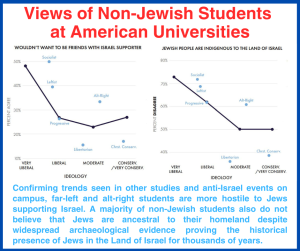

The ancient Jewish festival of Purim, celebrated this year on March 24, is a testament to resilience, courage and the triumph of good over evil. Purim celebrates the perseverance of Jews against one of the leaders of Persia – now Iran – who plotted to kill all the Jews in his domain in the 5th Century BCE. Purim resonates deeply with contemporary challenges faced by American Jews, particularly the need to confront adversity while preserving their identity.
Anti-Jewish venom increasingly plagues university campuses. Universities should be places of learning, open debate and academic research but they have become hotbeds of fear for many Jewish students. A new study conducted across multiple campuses with a significant Jewish population reveals the social cost of being Jewish. Their identity is making them vulnerable to attacks, both verbal and physical, much like other examples in Jewish history.
Growing Numbers of Jewish Students Hide Their Identity to Fit in
A new federal civil rights complaint against NY’s Sarah Lawrence College asserts that it is “safe to be Jewish as long as you are openly anti-Israel.” The overwhelming majority of American Jews support Zionism – the return of exiled Jews to a Jewish state in their ancestral homeland; this is the opposite of ‘colonization.’ The Hamas-Israel war puts Jewish students in the crosshairs of pro-Hamas supporters who demonize supporters of Israel – often using “Zionist” as a substitute for “Jew” to prevent accusations of bigotry.
MIT student Talia Khan is “traumatized” on campus as “anti-Israel club members stated that violence against Jews who support Israel is acceptable.” This fear is only one reason why a skyrocketing number of Jewish students feel they need to hide their Jewish identity – nearly doubling to 30% in a year and a half. A new study conducted by a Tufts Univ. professor proves that their fears are justified as a large share of non-Jews reported they did not want to be friends with someone who supports Israel – confirming results in other recent studies.
“The vast majority of Jewish students say they would feel social pressure just from taking the basic stance that Israel as a Jewish country should exist,” according to the study’s author. Two-thirds of Jewish students pay a social penalty for supporting the existence of Israel as a Jewish state. Young American Jews should be able to proudly embrace their heritage without facing prejudice and social stigma.

Professors Acting as Divisive Political Advocates
Professors are increasingly being pressured to take a position on the Hamas war against Israel. This is disproportionately affecting Jewish professors. Historically, professors in fields not related to the Arab-Israeli conflict show no reluctance to openly scold purported Israeli policies. At the same time, professors supportive of Israel have been reluctant to take a stand unless it is within their academic field.
Univ. of California at Berkeley professor Ron Hassner recently started a sit-in protest – eating, sleeping and teaching in his campus office – until university administrators provide protection and support for their Jewish students. Hassner announced that “if my students feel that they cannot walk safely across campus without being bullied, then I will not cross campus either.”
The Ivy League university, Dartmouth College, is a shining example of how to use education as an opportunity to build dialogue between Muslim and Jewish students and professors. Middle Eastern Studies professor Ezzedine Fishere and Jewish Studies professor Susannah Heschel hosted forums for the campus community to talk together after 10/7. Fishere stated: “What we did is our job. And our job is to teach not to advocate.”
Modern Day ‘Queen Esther Moment’
How Jews respond when faced with a grave threat – especially with annihilation – is sometimes known as a Queen Esther moment. Esther was married to the king of the Persian empire in the 5th Century BCE when one of the king’s officials, Haman, convinced the king to allow him to kill all the Jews in Persia. Queen Esther revealed the plot, saving the Jewish people from genocide.
At the recent ADL “Never is Now” conference, People Love Dead Jews author Dara Horn announced: “We’ve reached our Queen Esther moment.” American Jews are facing adversity and should be inspired by Queen Esther’s courage and bravery. The U.S. Jewish community has an opportunity to proudly stand for their beliefs rather than hiding their identity.
Attacks against American Jewish students have prompted a greater connection with the Jewish community and Israel. Acts of anti-Jewish hatred often increase Jewish pride. A recent study showed a sharp rise – from 26% to 43% in about a year – in the number of U.S. Jewish students who feel very close to a Jewish community. Recently targeted Univ. of California at Santa Barbara Student Government President Tessa Veksler declared: “We are showing resilience and strength. The Jewish people are not going anywhere.”
================================================

1. Purim is a reminder to proudly display Jewish identity
The story of Purim and the courage of Queen Esther serve as timeless reminders of the resilience and determination inherent to Jewish tradition. From ancient Persia to the Holocaust to the present day, Jews confront adversity with courage, fortitude and an unwavering commitment to their identity. Relentlessly attacked in America since 10/7 – especially on university campuses – Jews increasingly feel the need to hide their identity. There is a growing movement for Jews to celebrate their Jewish heritage proudly and visibly.
2. Jewish students need to be included on campus – not shunned
Increasing numbers of young Jews are feeling the need to hide their identities because they live in fear of being targeted and ostracized. A recent ADL survey concluded that “social networks and social norms increasingly point toward a growing acceptance of antisemitism” and a new study revealed that 66% of American Jewish students are frightened that there will be a social penalty for supporting the Jewish state. This result is confirmed by the 33% of non-Jewish students who do not want to be friends with Zionist Jews. Creating an environment of acceptance and respect for all religious and cultural identities is essential for fostering diversity and promoting academic excellence. This includes Jews.
3. Universities are for learning and dialogue not hatred and division
The goal of earning a degree in higher education is to learn and grow in an environment that fosters intellectual curiosity and debate. Now, there are too many examples of students who support the Jewish state being silenced and attacked. It is vital that universities celebrate the exchange of different ideas openly. The promotion of acceptance, empathy and mutual respect can ensure that universities remain beacons of progress for generations to come.
================================================

A. Not Jewish? Support your Jewish friends, classmates and neighbors, now more than ever
Only 3% of non-Jewish students have ever attended a pro-Israel event on campuses with a sizeable Jewish student-body where pro-Israel events have been organized, even though Jews often attend and support non-Jewish communities. This compares to 10% who have attended pro-Palestinian events. Non-Jews can foster unity and understanding by learning about Jewish history, customs and beliefs and challenging stereotypes – opposing anti-Jewish hate wherever it appears. A visible show of unity displays a sense of belonging and creates a society where everyone feels accepted, respected and valued.
B. From Kindergarten to College, if you experience or witness acts of hate or violence against Jews, use these free legal resources:
Examples of situations that may be legal violations, include:
================================================

American Kidnapped by Hamas Speaks Out for First Time
A 59-year-old Chicago mom and therapist, Judith Ra’anan, and her 17-year-old daughter, Natalie, were abducted from a kibbutz home by Hamas terrorists during its 10/7 attack against Israel. The two women were the first hostages to be released. Here are selected quotes from Judith’s interview with NewsNation, Part 1 and Part 2.
I started walking towards the room of my daughter, and that was also the moment that a rocket hit the bedroom where I was. I simply said, ‘Honey, do you remember how you’ve seen the movies? Those guys that have all this military artillery and stuff that come with guns and all? That’s what’s going to come through the door, so don’t panic.’
My girl was afraid. She said, ‘Mom, I’m afraid to be raped.’ I said, ‘Nobody’s going to do anything to you.’
After the terrorists stormed the home, one Hamas fighter told me, ‘You tell your neighbors to get out of their safe rooms, you tell them to get out, or I’m going to bomb the whole building.’
After I was badly cut by a terrorist’s knife, I said to God, ‘Do you want me to die like this?’ I knew that if the blood kept on going, I’m just dead.
The minute we were brought into a Gaza hospital, all the nurses were standing there and cheering. They were all so happy that they came back with prey, with Israeli Jewish prey.
In captivity, I thought of my mother. Is she OK? Is she dead? Is she alive? You had no way of knowing.
I was simply afraid to just die there. The Red Cross never came.
The hostages still in captivity are going through mental, physical, emotional hardship and need to be released. You don’t know if you’re going to be dead or alive.
================================================

Unbreakable Bond: America-Israel Relationship Endures
U.S. Senate Majority Leader Chuck Schumer (D-NY) recently called on Israel’s government to hold new elections soon because “Israeli Prime Minister Benjamin Netanyahu’s government no longer fits the needs of Israel after Oct. 7. If the current government remains in power, the U.S. will have no choice but to play a more active role in shaping Israeli policy by using our leverage to change the present course.”
Schumer also stated that “it bothers me deeply that most media outlets covering this war, and many protesters opposing it never noted that Hamas has gone to great lengths to make themselves inseparable from the civilian population of Gaza by using Palestinians as human shields.” He called for Palestinian Authority leader Mahmoud Abbas to step down.
Schumer’s speech from the Senate floor was met by mixed reactions within the Jewish community, including concerns that his message will be unintentionally amplified by opponents of Israel. Israeli Ambassador to the U.S. Michael Herzog stated: “It is unhelpful, all the more so as Israel is at war against the genocidal terror organization Hamas, to comment on the domestic political scene of a democratic ally. It is counterproductive to our common goals.”
This dustup isn’t the first time that there have been differences between allies, including America and Israel. Past issues include the 1956 Suez crisis and the more recent sales of advanced weapons to Saudi Arabia. Throughout their shared history, American and Israeli shared values have led to an enduring partnership.

Schumer’s comments come as the Israeli Defense Forces are in a holding pattern ahead of their planned ground operation into Rafah – the last remaining Hamas stronghold and complicated by the presence of a mass of Gaza civilians. Israel’s goal is to secure the release of its remaining hostages and to destroy Hamas.
President Joe Biden called Rafah a “red line” and expressed concern over humanitarian needs, reiterated in a recent call with Israel’s prime minister. Conversely, House Minority Leader Hakeem Jefferies (D-NY) responded that “there is no possibility for a just and lasting peace” unless Hamas is “decisively defeated.” The IDF announced that Rafah civilians would be evacuated to “humanitarian islands” and provided with housing, food, water, and other necessities.
The president also is leading efforts with Qatar to help broker a ceasefire of several weeks that would include Hamas releasing hostages from its captivity in exchange for terrorists held in Israeli prisons. Hamas demands the release of thousands of Palestinian prisoners, including 100 terrorists with ‘blood on their hands’ for murdering Israelis.
Stories Impacting American Jews
Stories Impacting the U.S. and Israel
================================================
———————————————————————————–
This content is developed by The Focus Project in partnership with Mercaz USA. The Focus Project distributes weekly news and talking points on timely issues concerning Israel and the Jewish people, including antisemitism, anti-Zionism and the delegitimization of Israel. It represents a consensus view across a spectrum of major American Jewish organizations. Mercaz USA recognizes and respects the diversity of views on these issues among its readers and the community at large.